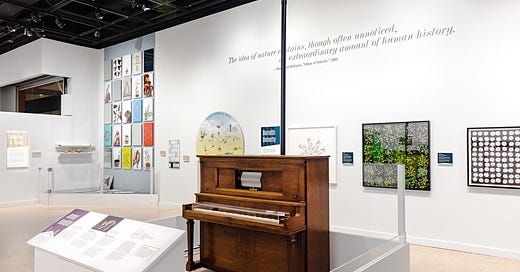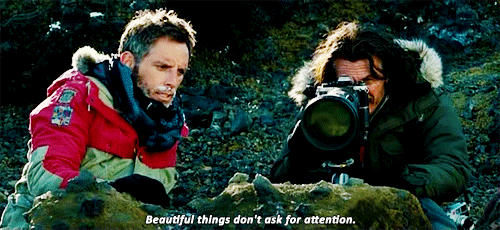Beautiful Things Don't Ask for Attention
A new podcast episode with artist and environmental activist Jenny Kendler.
I live with an incredible tension.
My natural orientation toward the world is one of a more-than-healthy skepticism of the popular combined with a love of what some might call corny or over-egged optimism. I refuse to enter a McDonald’s and ignore The New York Times bestseller list, but I love a good Ted Lasso quote and shed a tear at the theater while watching Elphaba defy gravity in Wicked. It makes a lot of my cultural engagement seem inexplicable to those who don’t know me well.
There are a lot of things in today’s culture that ask for - and even steal - your attention and become popular through sheer force. Having spent 17 years in marketing and advertising, there are plenty of ways to ‘game’ the system and generate artificial attention and even affection. In 2023, McDonald’s spent nearly $400M in global advertising and pre-orders for books are so crucial to making bestseller lists these days that even traditional celebrities offer gifts and perks to entice them.
Yet, things that seek my attention rarely earn my attention.
The subject line of this newsletter is quote from the book ‘The Secret Life of Walter Mitty” by James Thurber and is shared by photographer Sean O’Connell (Sean Penn) with Walter Mitty (Ben Stiller) in the film version. Walter defies his own gravity, escaping his very unadventurous life to chase the uber-adventurous Sean around the world to secure a lost film negative set to be the cover photo for the final issue of LIFE magazine.
Sean shares this notion with Walter when they glimpse a rare snow leopard.
It’s one of my favorite films even though the reviewer for The Guardian wrote that Walter Mitty “would have done better to keep his life secret.”
To me, it’s reassuring to see that there is space in a world where people are somehow famous for being famous for people like Walter and Ted, who don’t demand attention. They do the little things to support the people around them and then we get to see them succeed. Like a song or a piece of art, their beauty is intrinsic to how they exist.
I think about this quote a lot in regards to nature and the more-than-human world.
Seeing an otter emerge from the icy sea in front of my hobbit hut on the Scottish island of Islay was beautiful.
Seeing - from a safe distance through binoculars - a Black bear and her young cub in the meadow near Mariposa Grove at Yosemite National Park was also beautiful.
No matter how many National Parks are set aside or spotting locations we tag on Instagram, these moments and these non-human animals are - in part - beautiful because they aren’t seeking our attention. We are lucky to glimpse them. They last seconds, maybe minutes, and are never guaranteed. They are transformative but can’t be transferred. We sort of have to live with an optimism that we’ll get to experience them again in the future if we’re lucky.
So how - in a world that is driven by attention-seeking - can we get attention for the beautiful (and sometimes not-so-beautiful) in nature and the more-than-human world?
Enter Jenny Kendler, the guest for the latest episode of Ecosystem Member.
The artist and environmental activist creates works of art that capture your attention through an intrinsic beauty, even if the underlying idea often shines a light on the ugly side of our relationship with nature and the more-than-human world.
One of the pieces we discuss in the episode is ‘Music for Elephants’. Kendler uses data on elephant poaching to create music that emanates from a player piano made with ivory keys - a key driver of elephant poaching. The piece is about tough topic but animated through a beautiful idea.
Even though they are flat and lifeless, charts, graphs and numerical tables can be alienating.
The over-reliance on data in modern environmentalism to tell the story of the human-impact on nature and the more-than-human world often drives people away. What we think of as attention-grabbing stats can leave the viewer depressed, rather than empowered, and sometimes rob the subject of its animacy and its beauty. But artistic work can bring that beauty back.
Jenny’s work leaves me with a healthy optimism that beauty can earn much-needed attention for nature and the more-than-human world.
"I think things come into our lives to help us get from one place to a better one." - Ted Lasso
Listen or Watch Now: Apple Podcasts / Spotify / YouTube
I hope you enjoy the episode. Thanks for listening.
Rick







This is a great read, and a way I hadn’t thought of to approach environmental activism and the climate crisis in particular. As someone who’s been trying to stay more informed on these and is often overwhelmed at how bad things are, I’m going to start seeking out art to understand the things I’m interested in. Thank you!